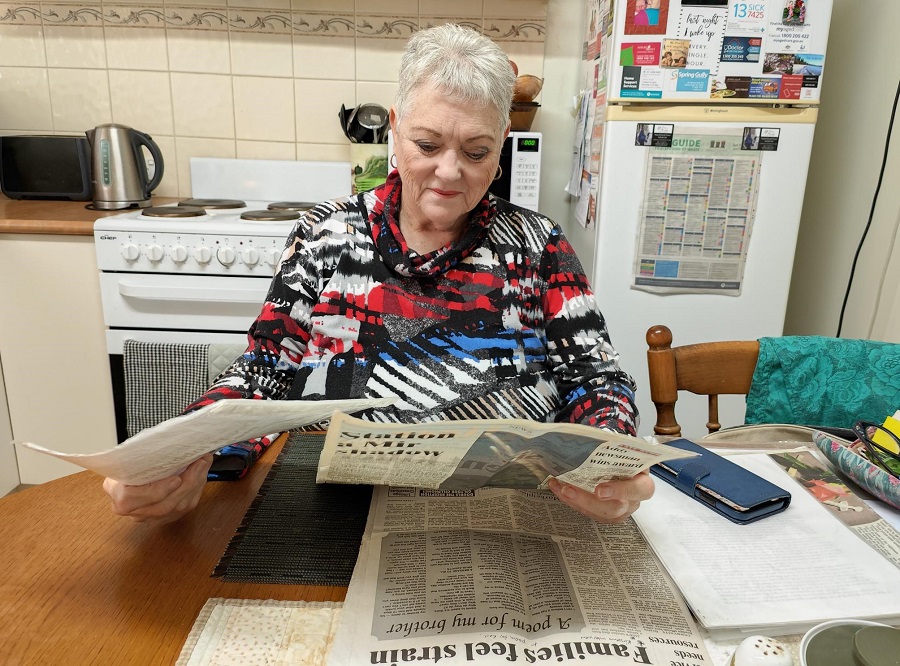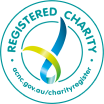“Rodney had come home and asked for help,” Gillian says, adding help was impossible to find. They tried a home detox. They tried accessing a Melbourne detox unit. The deal was, call every Wednesday between 10am and 2pm, and if Rodney was still alive and ringing after six weeks, a bed could be found. Gillian believes had there been a service in Bendigo 24 years ago, Rodney may have celebrated his 50th birthday this year.
A year after his death, there was a drugs summit in Melbourne which led to 14 pages of reports in the Herald Sun, and just a couple of paragraphs in the Bendigo Advertiser. Gillian was outraged. She called the local paper to tell them Bendigo also had a big drug problem.
The Advertiser began a series of front-page stories, starting with the headline Our silent killer. The Grassroots group was formed, a community forum was called and attended by counsellors, politicians, health services, police and parents. Bendigo Community Health Services and the Salvation Army joined with the Grassroots group to lobby State Government for a detox unit, which resulted in $2.1 million being awarded.
By late 2002 the former Elizabeth Lodge aged care home in North Bendigo was purchased for the purpose, much to the fear and objection of many locals. Gillian has kept the articles, editorials and letters to the editor from those years. The laminated clippings are sometimes hard reading. Grief is laid bare. Frustration. Pleas. Love. And compassion. Alongside letters of complaint against the pending unit, there are plenty of support.
“There was a lot of opposition within the community, and it went to VCAT,” says Nova House Senior Leader Sheenah Van Eck. “People were saying, ‘we don’t have that sort of problem in Bendigo’.”
Passionate people – and four cats – meet the need

Sheenah (above) had worked in Bendigo Community Health Services’ Alcohol and Other Drugs service for ten years when the unit opened in 2004.
“It was very, very, very bad,” she says of the extent of substance use in Bendigo.
“There was very much a country mentality of people not wanting to go to the city to detox, and so people didn’t get help and their lives just got messier and messier.
“Statistically, Bendigo uses the exact same percentage of drugs as Melbourne does. People often think just because we live in the country, we have different drug use than Melbourne. We don’t. The difference is, we don’t have the same support.”
Sheenah says in 2004, people may have been addicted to heroin, cannabis or alcohol. Sometimes two substances. “Now, it’s three or four. Such as cannabis, meth, benzos, plus a little bit of alcohol and GHB. There are more drugs out there to bring into the cocktail.”
Nova House welcomes clients from far and wide. The five-bed unit is consistently booked, however the wait is short. People spend seven days here with 24-hour support to withdraw from substances.
The unit is as warm and welcoming as its staff. The sunny Laminex kitchen has a well-used collection of tea and coffee canisters. The fruit bowl is bursting with rosy autumn apples. The artwork is bright and happy. The veggie garden flourishing.
“Our focus 20 years ago, and it still is, is to have a homely and welcoming space that reflects our country values,” Sheenah says.
It’s less like a hospital and more like a group retreat. Although Sheenah says that means the unit isn’t suitable for clients with more complex medical and psychological illnesses, who still need to go to Melbourne to detox. “And we have the same problem in that they still won’t go,” Sheenah says.
“We now need a purpose-built facility, and one that’s tiered, so we can take more complex needs clients, and then transition them down to the next tier, and then into support services such as rehabilitation or day programs, because it’s a journey.”
At Nova, that journey is made easier thanks to a staff of lived experience – either of addiction or supporting people with addiction – and one resident tabby.


There’s always been a cat here. First Yogi, then Rusty and Peaches and currently, Bruce. There are three little plaques in the garden to honour his predecessors.
“They’re absolutely important,” Sheenah says (who qualifies she is NOT a cat person). “People will sit with a cat purring on their lap for ages and just cry. People will say they slept so well because the cat was at their feet all night, and must have known they needed the company. And the cats have a great life. They always have someone’s attention – just not mine!”
Cats aside, Sheenah is a fierce advocate for the staff. “I would say Nova House staff come from such a wide variety of backgrounds and experiences that it’s a little bit like a jigsaw,” she says. “We all fit together to make a whole that can meet the needs of every single person who comes through that door. I say to people, I have a staff member for you … We’re a real mixed bag. We so are.”
Returning for good

Drew Reid (above) was one of two nurses here when Nova House opened. He’s come and gone over the years, but continues to return. He tried to retire once, with no lasting effect. Why? “It’s because of the courage of the clients to be here,” Drew says. “It’s watching people’s mental health improve through their time here and my passion for good outcomes and for seeing the choices people can make.”
Before signing up for his pioneering Bendigo role Drew had worked as a mental health nurse. “For me, the dual disability of mental health and substance use couldn’t be separated, and yet each service ignored the other,” he says of his motivation to join Nova House.
He says mental health services would advise people to “sort out their substance use” before addressing their mental health, and vice versa.
“For me, this was a new way to link my mental health experience into a drug and alcohol service, and take an integrated approach,” he says.
“You can look at people’s use of opiates and alcohol and cannabis and see them numbing the pain of life, and you can look at people’s use of stimulants like methamphetamine and see them trying to manage their lives.”
Drew remembers the unit opening quietly, mostly due to the neighbourhood objections. “Within the first three months of opening we had neighbours contact us to say they were really hesitant about having us here, but actually it’s the quietest place in the block,” he says.
Drew recalls mental health reforms and drug and alcohol reforms over the decades that meant less funding for a time, and the loss of many experienced staff. Conversely, he says the house has fostered the careers of many drug and alcohol workers who started out on placement here during their TAFE or La Trobe studies.
“It’s also been an education space for nursing students and community services students,” he says.
“If they showed interest and were enthusiastic about being here, we’d try to get them on our casual staff, and quite often they would end up working here and learning great skills, then going on to share their knowledge and experience with other parts of the health service.”
Drew remembers many of the people whose lives he has helped turn around. One woman from the early years sticks in his mind; a grandmother in her 60s from a small regional town. She and her husband had a great outdoor area, which became the social scene for the town, and for a lot of drinking.
“She lost her licence to drink driving, and her daughter said she wasn’t allowed to visit the grandkids until she did something about her drinking. She was heartbroken, and was referred through to us. A few weeks after being here she rang to tell me her life had changed. She was riding her bike around town, with her granddaughter riding beside her. She said she looked around at all the drunken people at her home and thought, that was me, and I don’t blame my daughter for what she did.”
Sheenah says often people come to the unit on the pleas of family and friends, sometimes via court or family services orders. But they need to be personally ready to detox for their experience to have the best chance of success. Often it takes several attempts.
“And they are welcome to do so,” Sheenah says. “And quite often that’s because when we first see the clients it’s usually for poly drug use. They might be smoking a lot of dope, drinking a lot of alcohol and taking methamphetamines. We get them back in three-five months later, but this time for only two substances, then we might not see them for another year, and their last visit is for one substance.
“Drug and alcohol recovery is a journey, and it’s not a straight path. Drug addiction is recognised as a chronic relapsing condition, so the reality is we’re often going to see clients more than once.”
Every client fills in a feedback form and there are thousands of written documents on record which are 99.9% positive. Sometimes staff receive flowers, sometimes thank you cards. The best is that phone call at the 12-month sober or drug-free anniversary to report back and say thanks. “That’s when I get all teary,” Sheenah says.
Gillian Burns is quite overwhelmed to learn that over 20 years there has been almost 3000 admissions at Nova House.
“I feel very proud,” she says, “because we did the hard work at the beginning … It was a giant success. Our group disbanded three months after Nova House opened, because we achieved our aim.”
Looking to the future
Staff at Nova House paused to briefly cut a cake and reflect on the anniversary recently. But their focus is more on what’s to come.
“Vapes will be our next big thing,” Sheenah says. “We think that’s certainly on the agenda and it will bring so many clinical problems. People who are vaping are at risk of being introduced to other substances because they have an addiction. Vaping is a gateway to other substances.”
Sheenah predicts the next ten years will reveal the true effects of vaping. “We predict Parkinsons-like symptoms because of the substances in vapes … All the new addictive substances will come with long-term health problems. We don’t know what they are, but they’re coming. I love New Zealand – if you’re born after 2009, you can’t buy cigarettes. Australia needs to nut up and do the same. And no vapes at all.”
Since Nova House opened, Bendigo Community House Services has introduced a Care Recovery Coordinator, a Family Drug Support worker, Mobile Drug Safety worker and an Intake and
Assessment officer. The next step will be to secure the funding for a new, purpose-built detox unit to cater for more complex clients.
“The various government departments are well aware of the need for a larger, purpose-built unit,” Sheenah says. “What we need is a facility with a tiered approach, so those who are acutely unwell don’t have to go to Melbourne, and that allows a person’s family and significant others to continue caring for and supporting them.”
Bendigo Community Health Services envisages a holistic unit for the broad needs of community; a thoughtfully designed facility with separate areas to safely support victim survivors of family violence, while providing withdrawal facilities for people who have used violence.
“There’s an identified need that’s acknowledged by all, and it will happen,” Sheenah says.
Learn about all of our Alcohol and Other Drug Services.

Nova House staff Agatha, Nomusa and Sheenah take a break in the house’s kitchen.






